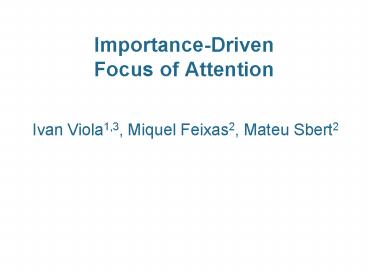ImportanceDriven Focus of Attention PowerPoint PPT Presentation
Title: ImportanceDriven Focus of Attention
1
Importance-DrivenFocus of Attention
Ivan Viola1,3, Miquel Feixas2, Mateu Sbert2
- and Meister Eduard Gröller1
1 Vienna University of Technology, Austria 2
University of Girona, Spain 3 University of
Bergen, Norway
2
Goal
- Input known and classified volumetric data
- High level request show me object X
- Output guided navigation to object X
3
Focusing Considerations
- Characteristic view
- Emphasis of focus object
- Guided navigation between characteristic views
4
Framework
5
Characteristic Views
- Overview
- All objects are visible
- Visibility of objects is balanced
- Characteristic view of focus object
- High visibility for focus object
- If possible other objects also visible
6
Characteristic View Estimation
view rating
characteristic viewpoint estimation
7
View rating
- For every view
- For every object
o2
o1
o3
8
View Rating
- Visibility
- High
- Low
- Location in image
- In image center
- Outside center
- Distance to the viewer
- Object close to the viewer
- Far from the viewer
9
Visibility Computation
o0 object 0 o1 object 1
r ray r0 sub-ray 0 r1 sub-ray 1 r2
sub-ray 2
10
Visibility Computation
11
View Rating Weights
12
Characteristic Viewpoint Estimation
view rating
characteristic viewpoint estimation
characteristic views
13
Characteristic Views
- Overview
- All objects are visible
- Visibility of objects is balanced
- Characteristic view of focus object
- High view rating (visibility) for focus object
- If possible other objects also visible
14
Obtaining Characteristic Views
- Sets of views and objects are random variables
- Views V(v1, v2, v3, ... , vn)
- Objects O(o1, o2, o3, ... , om)
- View rating (visibility, weights)
- Information channel between V?O
- Conditional probability p(ojvi)
- Mutual information between V and O expresses
degree of dependance
15
Obtaining Characteristic Views
- Viewpoint mutual information is dependance
between vi and O - High values high dependance
- Small number of objects
- Low average visibility
- Low values low dependance
- Maximum objects visible
- Object visibility is balanced
- Minimal VMI determines the best view
16
Probability Transition Matrix
...
p(omv1)
p(v1)
p(o1v1)
p(o2v1)
p(v2)
p(o1v2)
p(v3)
...
...
...
...
p(vn)
p(omvn)
p(o1vn)
...
p(o1)
p(o2)
p(o3)
p(om)
17
Viewpoint Mutual Information
- Degree of correlation vj?O
18
Characteristic Views
- Overview
- All objects are visible
- Visibility of objects is balanced
- Characteristic view at focus object
- High view rating for focus object
- If possible other objects also visible
19
Incorporating Importance
importance distribution
o1
o2
o3
20
Resulting Characteristic Viewpoints
21
Interactive Focus of Attention
o
1
22
Emphasis of Focus Object
- Levels of sparseness
dense
representation
0
max
importance
23
Emphasis of Focus Object
- Cut-aways to unveil internal features
- Labeling to add textual information
vessels
intestine
kidneys
24
Guided Navigation Between Objects
- Decreasing importance of Object X
- De-emphasis of Object X
- Change to overview
- Increasing importance of Object Y
- Emphasis of Object Y
- Change to characteristic view of Y
25
Refocusing
Overview
Characteristic view 1
Characteristic view 2
26
Example - Stagbeetle
Focus view 1
Overview
Focus view 2
27
Smooth Transition to Focus View
o
o
2
1
o
3
28
Example - Human Hand
Any Questions?
29
Conclusions
- Focus of attention framework
- Characteristic view estimation
- Guided navigation
- Steered by changes in importance distribution
- Future Work
- Zooming to the focus
- Other smart visibility techniques
- Available soon as plugin in volumeshop.org
30
Thank you!
The End
- viola_at_cg.tuwien.ac.at
31
Comparison to Viewpoint Entropy
- Viewpoint Entropy Bordoloi et al. '05
- Viewpoint Mutual Information
32
Visibility Computation
- For overview and all focus objects
- For every viewpoint
- For every object background
importance distribution
o2
o1
o3
o1
o2
o3
33
Visibility Computation for Focus Object
o0 object 0 o1 object 1
r ray r0 sub-ray 0 r1 sub-ray 1 r2
sub-ray 2
34
Visibility Computation
o0 object 0 o1 object 1
r ray r0 sub-ray 0 r1 sub-ray 1 r2
sub-ray 2
35
Probability Transition Matrix
active om
...
active o1
inactive

